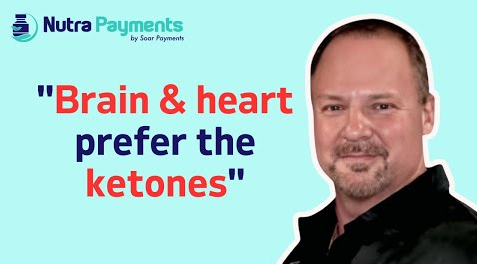Maybe you've heard about exogenous ketones, but you don't exactly know how they work. We've got you covered. Learn what you need to know!
Ketogenic diets have been given a variety of gimmicky names over the years - the South Beach Diet, the Atkins Diet, etc.
Each has a slightly different set of rules to follow, but the underlying principles and science behind them are essentially all the same.
If you're reading this, chances are that you have started, or are thinking about starting a ketogenic diet. Either way, it's important to understand that one of, if not the major benefit to a ketogenic diet is that it sends your body into a state of ketosis.
Ketosis can be pretty difficult to stay in.
However, with exogenous ketones, it makes staying in ketosis and adhering to your keto diet a breeze. If you don't know what exogenous ketones are, or don't really understand the science behind the keto diet, allow me to clear the air.
The Ketogenic Diet Explained
Everyone's diet consists of the three major macronutrient groups: protein, carbohydrates, and fat.
The general dietary wisdom says that each meal should contain a fistful of protein, a fistful of fat, and two fistfuls of carbohydrates.
To put it in concrete terms: a good meal will have 1 part chicken, 1 part avocado (or some other fatty food) and 2 parts rice (or potatoes or pasta, you get the gist).
This is the generally prescribed ratio for good reason: carbohydrates are a good source of fuel for the body.
If we're used to having carbs as a fuel source, our bodies' desperately crave them (which is why potato chips are so addicting), and in today's modern food environment, we can get a lot of them.
But what if there was a healthier, more efficient fuel source our bodies could run off of instead of carbohydrates? This is the question the keto diet poses, and answers. Read more about the Keto diet, here.
A New Ratio
Instead of the traditional macronutrient ratio, ketogenic diets are high in protein, high in fat, and extremely low in carbohydrates.
The reasons for this are two-fold: the first is that carbohydrates, while a good source of fuel, are difficult to fill up on and feel satiated, resulting in unwanted weight gain in today's food environment.
This is why a bag of potato chips or a plate of pasta on its own never leaves you satisfied. Because of this, many people today are hopelessly addicted to carbs. For keto dieters, it's much easier to just forego the temptation entirely.
The second reason for the lack of carbohydrates in keto diets is that without them, your body switches into a different state (ketosis) and burns different fuel (ketones) to give your body energy.
Ketosis Explained
When you're consuming a lot of carbohydrates, your body is burning the glucose found in those are carbs for fuel. This puts you in a metabolic state known as glycolysis.
On a keto diet, on the other hand, your body doesn't have those carbs to burn because you've barely eaten any at all!
So what your body does instead is produce molecules known as ketones in your liver that are made from the fatty acids in your foods and body.
Using fat rather than carbs as fuel has a few benefits. The first is that eating a high-fat diet is harder to overindulge in because it is more calorie-dense and thusly, more filling.
Proteins and carbs have 4 calories per gram, while fat has 9 calories per gram. Because of this, a lot of people easily shed unwanted weight without even having to count calories on a keto diet.
The second reason running off ketones can be better for you is that they don't just power your body, they power your mind, and studies have shown that they have beneficial neuroprotective properties.
Many keto dieters report that once their bodies' have gotten used to the switch in fuel, they feel an enhanced clarity of mind.
This might be because, in ketosis, your body doesn't experience the daily fluxes in blood-sugar levels that you experience when using carbohydrates as fuel so you don't get that sluggish feeling midday when you haven't eaten lunch yet.
Ketones are able to keep your blood-sugar levels stable throughout the day by replacing glucose entirely.
Of course, even one high-carb meal can kick you out of ketosis because glucose is always your body's first option. This is where exogenous ketones kick in. Think of them as a nutritional supplement specific for keto diets.
What Are Exogenous Ketones?
Simply put, exogenous ketones are ketones that exist outside your body and are not produced by your liver.
Nevertheless, your body can utilize them the same way if consumed. It's a pick-me-up you can use to put your body back into a state of ketosis or keep it there, full of energy.
Exogenous ketones can come in powders like protein or even in the form of oral sprays, as well as in nutrition bars and much more.
If you're a keto dieter, exogenous ketones can be a good performance-booster to use before the hitting the gym or even after to keep your energy up.
They can also function as a mood-enhancer when you're feeling grumpy or irritable because you're cravings carbs. In this same way, they're a great weight loss tool.
But exogenous ketones aren't only good for the fitness-minded. Studies have shown that because of their aforementioned neuroprotective benefits, exogenous ketones and ketosis, in general, are great for treating epilepsy, as well as a host of other physiological disorders.
Is A Ketogenic Diet Right For You?
Ketogenic diets can be tough to stick to. Our society is currently in love with carbs and they can be pretty hard to avoid. It requires a serious lifestyle change to pull it off. The benefits of ketosis, however, are too good to pass up.
It is our belief that ketogenic diets make people happier and healthier, and anyone can do it with the right discipline.
If you're thinking about starting a ketogenic diet or are already on the team, check out our line of exogenous ketones. They'll help you reap all of the possible benefits of the keto diet.

 ACCOUNT
ACCOUNT
 CART
CART





